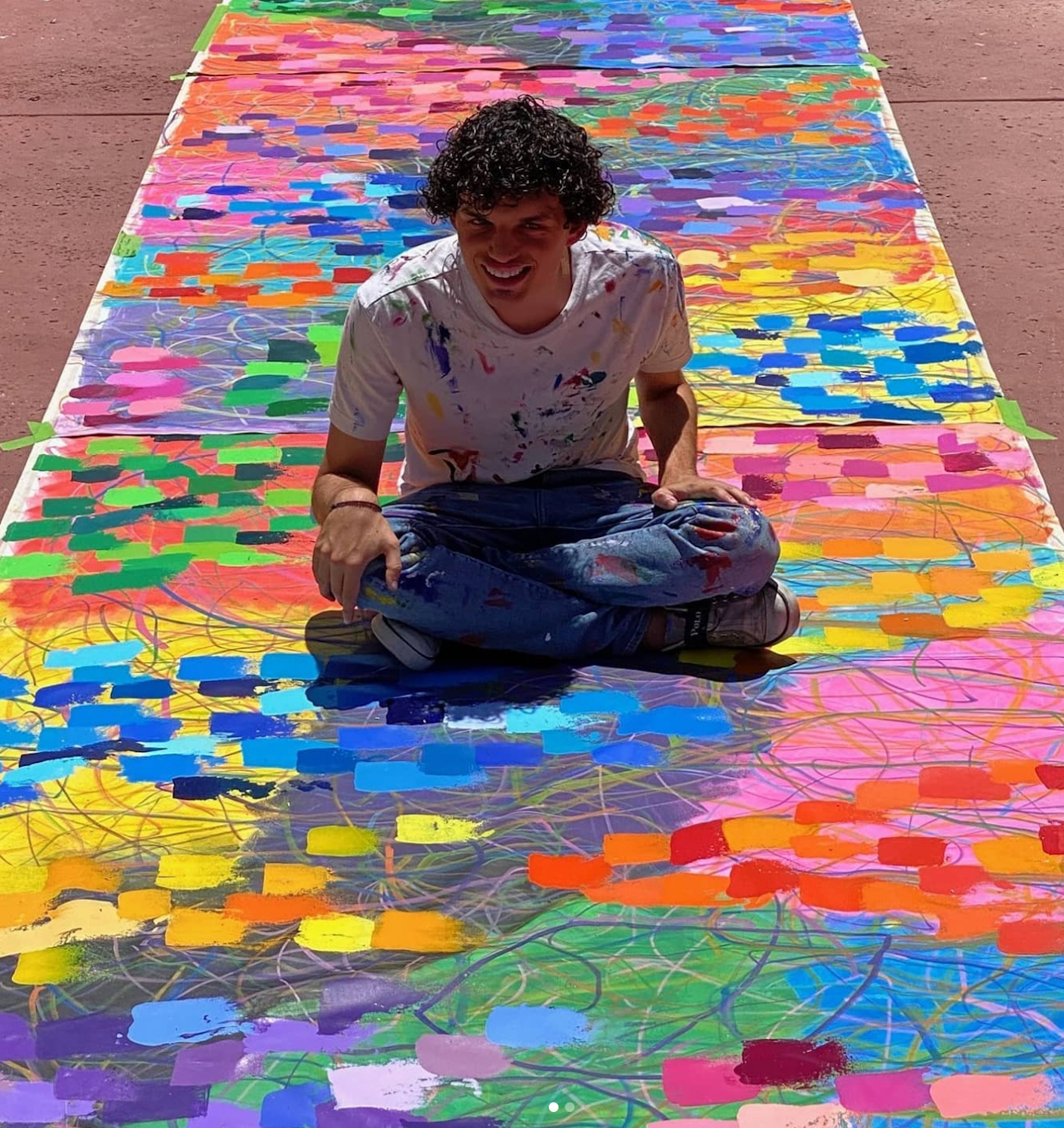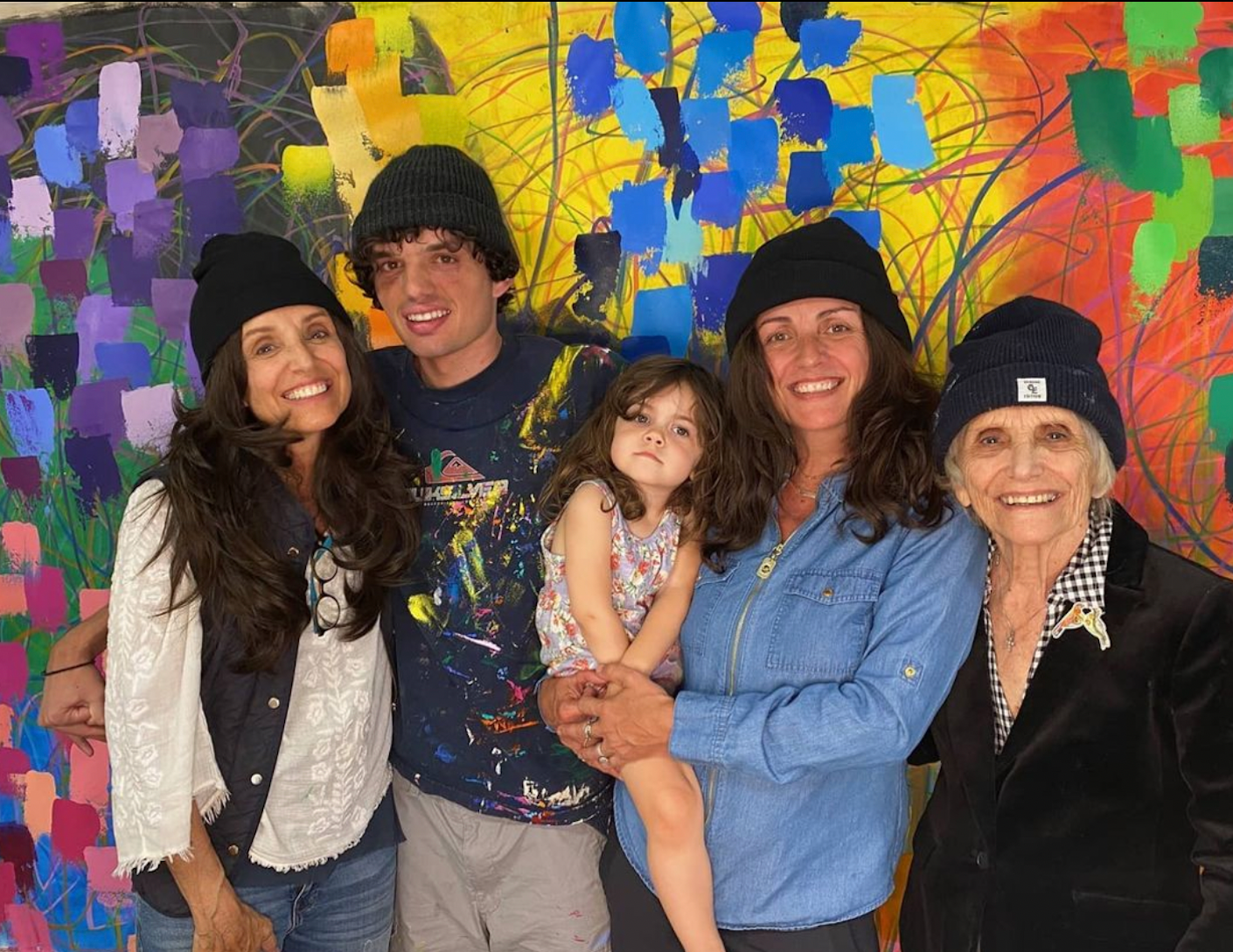Nicholas Kontaxis Started Painting to Communicate, but Now He’s Taking the Art World by Storm
Katie Couric Media

“Nicholas Kontaxis is neurodiverse with atypical communication. He’s also insightful, loving, and intelligent, all of which I feel is expressed vibrantly through his art.”
Nicholas Kontaxis’ paintings might give you a modern-day Jackson Pollock vibe. One main difference though is that this 26-year-old artist is self-taught. He’s also neurodiverse.
The seemingly simple names of his pieces — “Buy yourself a cake,” “Blue Giraffe,” “Eat Hash Browns,” “Frosted Flakes,” and “I’m really busy” — will put a smile on your face. Yet, the details in his work will leave you analyzing a piece for hours.
Kontaxis experienced his first seizure when he was 14 months old. The following four years were a waiting game, filled with tests and procedures, until he was diagnosed with an intractable brain tumor. He has now had over 100,000 seizures to date.
Kontaxis is largely non-verbal, but art is his way of communicating with the world. His mom describes him as a shining light — a resilient, joyful, and hardworking young man.
Over the last few years his work has gained popularity; he’s traveled to London and New York for shows and has been commissioned to do work for Adidas, the LA Chargers, and Kaiser Permanente. Now, throughout June, his collection will be on display at the UTA Artist Space in Beverly Hills for his solo exhibition, “Catch Me”.
We talked with his mom, Krisann, about her son’s work, his process, and what’s next for the budding artist.

KCM: How did Nicholas first become interested in art?
Krisann: Being largely non-verbal, a significant element of caring for Nicholas is anticipating his needs, and part of that included selecting activities for him that he might enjoy. He first started painting as a kid, and as his interest developed into his adolescence, it became clear that not only was this an activity he loved but that this love was born out of talent. He had an eye for color and balance, along with astonishing manual dexterity, all of which exploded onto the canvas.
How prolific he’s proven to be is possibly the most astonishing part. It’s been an amazing gift for us all to be able to witness Nicholas’ prodigious skill emerge from a state of such profound disability.
How has creating art helped him physically, mentally, and emotionally?
It has been life-defining and a reflection of his inner spirit. Physically it’s therapeutic — he works on large and small scale, on the ground, sitting, standing, all of which helps his core and muscle stability.
He works in an environment of canvases, paints, and tools that he can access freely, and then he just keeps going at it. He works mostly with palette knives in acrylics and oils on canvas and linen, but has been experimenting increasingly as of late, much of which will be on display at his next solo exhibition this June, “Catch Me.”
More importantly, it has helped him mentally and emotionally. Those who know him intimately would describe him as surprisingly sharp and profoundly spiritually connected. However, his speech limitations have always hindered his ability to connect in this way with outsiders in terms of external interactions. What’s amazing is how his depth as a thinker and as a person is revealed through his art in such a way that it allows the world to experience the deepest, most authentic version of Nicholas that only his closest family and friends had been able to witness prior.
His work really seems to speak to a variety of people in a variety of ways, and it’s a large part of what makes his story so incredible.
How does he name his pieces?
Nicholas has intermittent spontaneous speech, usually in the form of short phrases and intentional words. So when he’s working on a piece, we write anything he says organically while creating the work, and tape it on the back. Sometimes you just know it’s the name he wants for the work. Other times he may have several choices and we ask him to pick one of them. It’s a unique process of naming a painting truly fitting of Nicholas’ uniqueness as a person.
You’ve now traveled internationally to showcase his work. Tell us about some of his exhibitions.
“Jump,” his debut solo exhibition in Los Angeles, was a sell-out that drew over 1,000 people in a single night. From there, things took off — he was featured all over the news and has had follow-up solo exhibitions all over the world, from Chicago to Palm Springs to London to Atlanta.
His next show, “Catch Me,” is his most ambitious yet. It’ll be in Los Angeles at the UTA Artist Space. The opening night event is from 5 – 8 p.m., but his work will remain on display throughout June. It’s a breakthrough body of work over two years in the making.

What part of the show are you and Nicholas most excited for?
The main piece in the show is the Browder Safety Net — the net that firefighters would hold under burning buildings, so people could jump to safety. It’s going to be suspended from the ceiling for the show.
When you google the Browder Safety Net, the photos remind me of Nikki — suspended in the air, with people on the ground ready to catch him, to take care of him.
I was in downtown LA at a salvage yard when I first saw the net and I instantly thought, “This tells his whole story.”
We have had a whole bunch of people making sure Nikki doesn’t die. How many times has this safety net saved people’s lives? I knew he could paint this beautifully. It’s a beautiful ode to all of the people who have been his safety net. And we had him get ash from our fireplace and start by striking the piece with ash, as an ode to firefighters, too.
I am so excited for everyone to see it at the show.